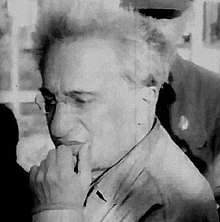Aaron Soltz
Aaron Aleksandrovich Soltz (Russian: Аарон Александрович Сольц; 10 March 1872 - 30 April 1945) was an Old Bolshevik and a Soviet politician and lawyer. He was informally known as the "conscience of the Party".[1] While partially responsible for the Soviet repressions he was one of very few high-ranking Joseph Stalin loyalists who openly objected to the Great Purge;[1] he died in a psychiatric clinic after years of involuntary commitment.[1]
Aaron Soltz | |
|---|---|
 Aaron Soltz in 1932 |
Biography
Soltz was born in Soleniki (now Šalčininkai) to a Jewish merchant family of Lithuania. He studied at the Law School of Saint Petersburg University then became involved in revolutionary work. He was a member of Russian Social Democratic Labour Party since 1898, and was involved in the organization of underground printing and publishing of illegal literature. Soltz participated in all three Russian revolutions, and was many times jailed and exiled. Many times he also escaped from his exile. When exiled to Turukhansk Soltz shared the same house and reportedly the same bed with Joseph Stalin.[1]
In 1917 Soltz was a member of Moscow Committee of the Bolshevik Party, an editor of Social Democrat and Pravda newspapers. Beginning in 1920 he was a member of the Central Revision Committee of the Bolshevik Party. Beginning in 1921 he was a Judge of the Supreme Court of Soviet Russia and from 1923 he was a Judge of the Supreme Court of the Soviet Union. In 1920-1934 he was a member of the Central Committee of the Control Commission of the Presidium of the Control Commission of the Communist Party, a member of the International Revision Committee of Comintern. From 1935 Aaron Soltz served as a Deputy Prosecutor General of the USSR, and was later the Chairman of the Judicial Collegium of the Supreme Court of the Soviet Union. (председатель юридической коллегии Верховного Суда).[1]
In October 1937, during the Great Purge, he gave a speech during Sverdlovsk conference of Party Activists (Partactiv) demanding that a commission be created to investigate Prosecutor General of the USSR Andrey Vyshinsky and the Purge's legality.[1] He was suspended from his work in Procurator Office and tried to contact Stalin, but to no avail.[1] In February 1938 Soltz started a hunger strike and was involuntarily hospitalized in a Moscow psychiatric clinic. He died there after seven years of involuntary psychiatric treatment.[1]
Works
- Сольц А. Н. Ленин. К пятидесятилетнему юбилею. Пенза: Пенз. отделение Центропечати, 1920. - 22 с. 6000 экз.
- Сольц А. и Файнбит С. Революционная законность и наша карательная политика. М.: «Московский робочий», 1925.- 126 с.
References
- Collection of biographical materials in chrono library (in Russian)